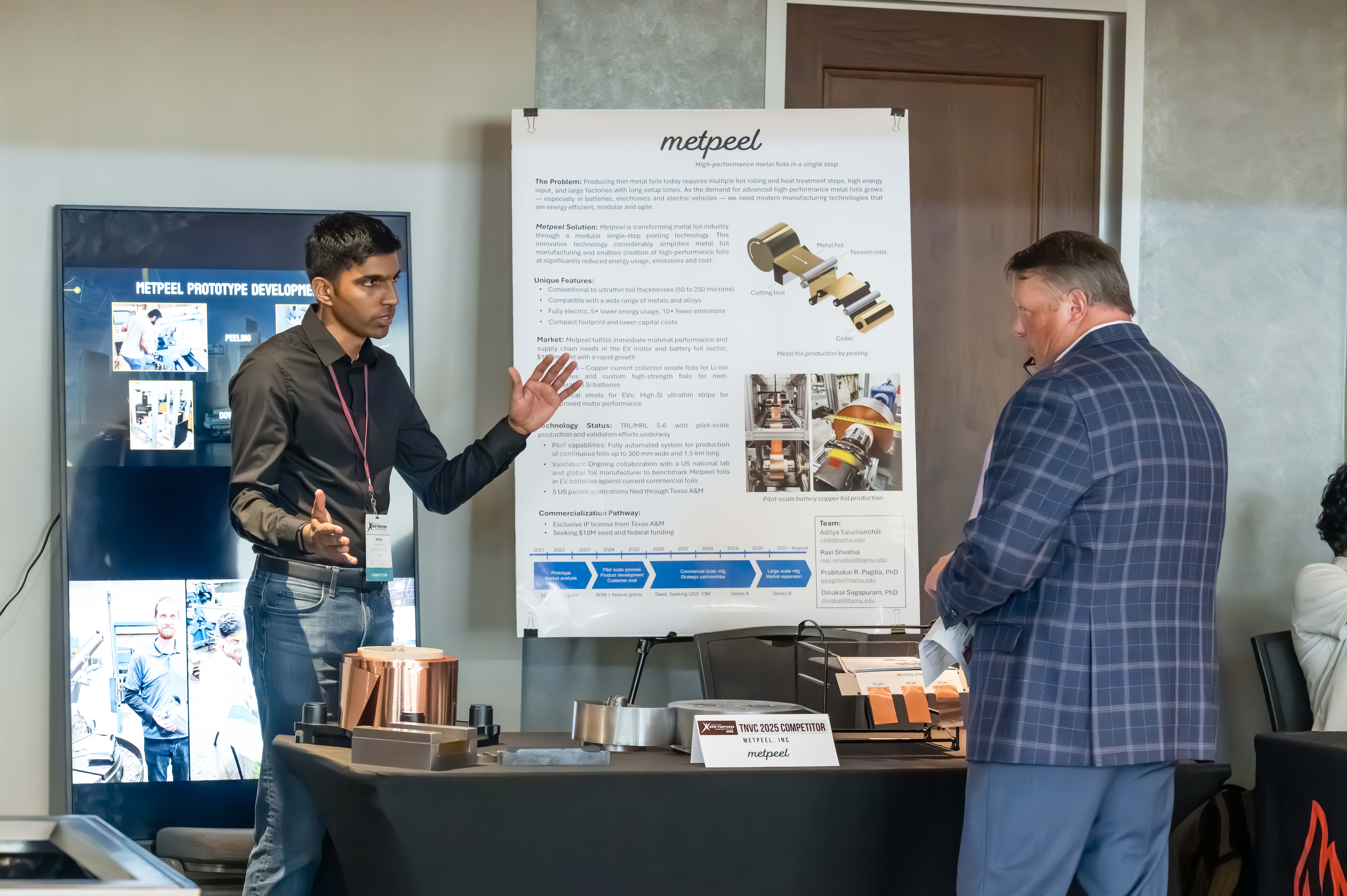By: Ashlynn Rutherford
Cutting-edge technology slashes energy and carbon footprint of ultrathin metal strip and foil manufacturing
Dr. Dinakar Sagapuram
Associate Professor & Mike & Sugar Barnes Faculty Fellow, Industrial and Systems Engineering
Dr. Prabhakar Pagilla
James J. Cain Professor II & Associate Department Head for Research and Operations, Mechanical Engineering
Metals such as steel, aluminum, and copper are the foundation of modern industry, yet producing them especially in ultrathin forms comes with a steep energy and carbon cost. Traditional rolling methods require heating slabs to more than 1,200°C, passing them through multiple reduction and finishing stages, and consuming about five gigajoules of energy per ton of steel. This approach not only drives up manufacturing costs but also generates roughly two tons of carbon dioxide emissions for every ton of rolled metal.
A One Step, Low Carbon Solution: Introducing Metpeel
In response to these challenges, Dr. Dinakar Sagapuram and Dr. Prabhakar Pagilla at Texas A&M University have developed Metpeel, an innovative clean-energy manufacturing technology that reimagines how thin metal strips and foils are made. Instead of heating and rolling, Metpeel uses a single-step, low-temperature “peeling” method to machine thin layers directly from the surface of a cylindrical billet, much like peeling layers from a log to make plywood. This approach dramatically reduces energy consumption by as much as 90 percent compared to conventional methods while producing zero emissions when powered by renewable electricity. It also enables the manufacture of high-performance, customized products without the added costs often associated with sustainable production. “The major benefits of this method are that, first, it is not necessary to heat the metal to blazing hot temperatures, and second, it allows production of flat metal in practically one step,” said Sagapuram. “This offers unparalleled energy and cost savings, in fact, up to 90% reduction in energy compared to the traditional method.”
Turning an Old Idea into a Scalable Innovation
Although the basic idea of metal peeling has existed for more than a century, Sagapuram and Pagilla’s team, which includes graduate students from both industrial and mechanical engineering, has transformed it into a practical and scalable manufacturing solution. Through innovations in tooling, component design, advanced sensors, and real-time control algorithms, they have created what may be the first automated metal peeling system capable of producing kilometer-long precision coils with exceptional tolerances and quality. The process can handle a wide variety of metals, including specialty alloys that cannot be produced using traditional rolling techniques. “This allows us to efficiently explore the material composition space and create tailored chemistries otherwise not possible to achieve specific functionality or properties,” said Pagilla
Future Implications: Recycled Metals, EV Batteries, and U.S. Supply Chains
The implications of this breakthrough extend far beyond improved efficiency. The researchers are exploring the potential to manufacture high-value products from recycled metals and scrap that are currently underutilized or discarded due to contamination. Because Metpeel does not require high-temperature processing, it can transform these materials into high-quality strips and foils, reducing waste while lowering production costs. The technology is also poised to address critical needs in the energy sector, including the production of ultrathin foils down to ten micrometers for electric vehicle battery electrodes. These foils are vital for next-generation high-density batteries, and Metpeel could help strengthen domestic supply chains by enabling production from U.S.-sourced raw materials.
Scaling Up: From Lab to Market
Having demonstrated the ability to produce coils weighing up to 100 kilograms, the team’s next goal is to scale operations to a capacity of 1,000 tons per year through a demonstration pilot facility. Achieving this milestone will position the technology for widespread adoption in the global metals industry, where scalability is essential for success.
Metpeel’s development has been supported by Breakthrough Energy through its Fellows Program, the U.S. National Science Foundation, and Texas A&M University’s Advancing Discovery to Market Program. The intellectual property is managed by the Texas A&M Innovation Office and licensed to a startup founded by the researchers to advance commercialization.

Picture showing a steel strip made using the one-step peeling technology. Courtesy of Dr. Dinakar Sagapuram.
Inventor Biographies
Dinakar Sagapuram is currently an Associate Professor and Mike & Sugar Barnes Faculty Fellow in Industrial and Systems Engineering at Texas A&M University. He is an expert in metals processing and manufacturing and his research activities in this domain range from fundamental exploration of materials physics using advanced in-situ techniques to development of scalable energy-efficient alternatives for metal production. His R&D activities at Texas A&M over the last 9 years have resulted in multiple peer-reviewed publications, inventions and patents. His technology development and transition efforts have been recognized by the Breakthrough Energy Fellowship Award (2021), TEES Engineering Genesis Award (2023) and SME Outstanding Young Manufacturing Engineer Award (2021).
Prabhakar Pagilla is currently James J. Cain Professor II and Associate Department Head for Research and Operations in Mechanical Engineering at Texas A&M University. He has been engaging in various high-impact research and developments efforts on roll-to-roll manufacturing systems for 29 years, and during this period, he has served as a principal investigator on several basic and applied research projects spanning TRL/MRL 1 through 7 developments with funding support from federal and state agencies, as well as many industries and non-profit foundations. His technology commercialization efforts have led to a successful startup (Roll-2-Roll Technologies) and extensive collaborations across sheet metal industries and other roll-to-roll companies.

